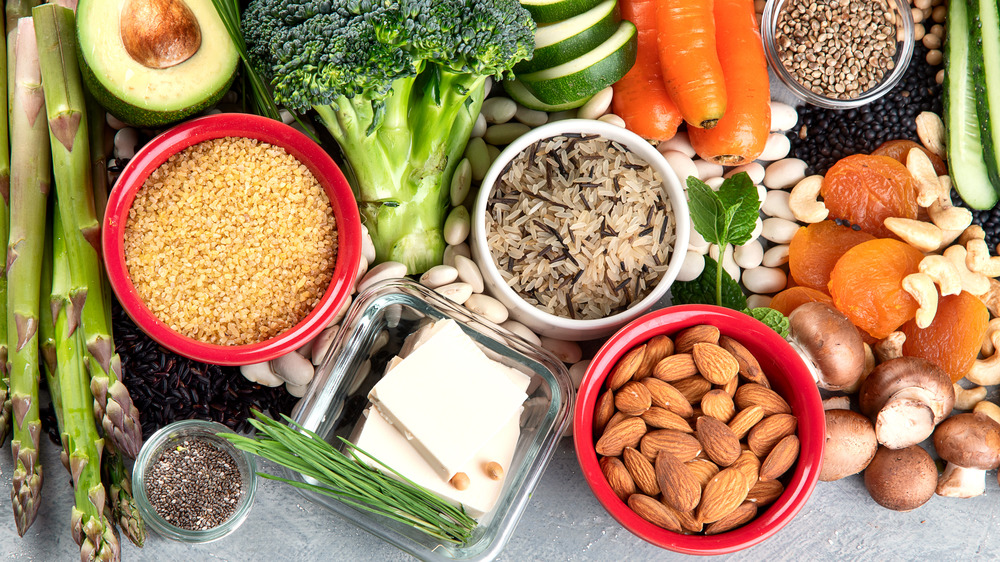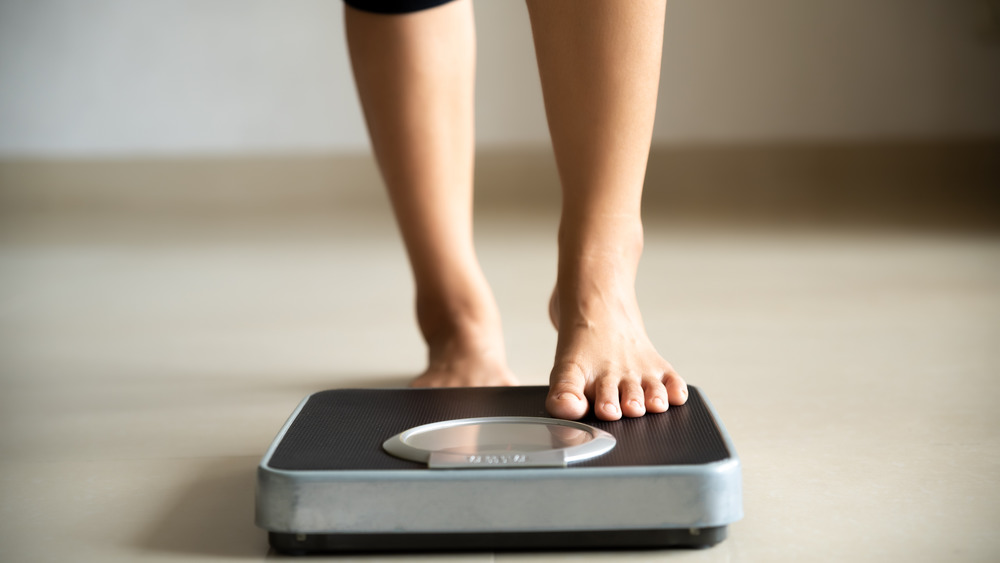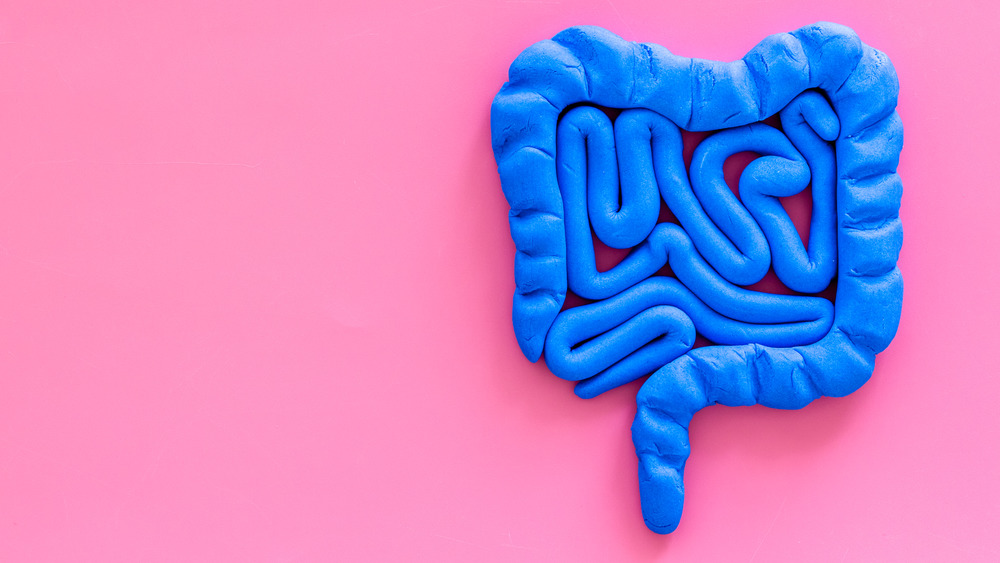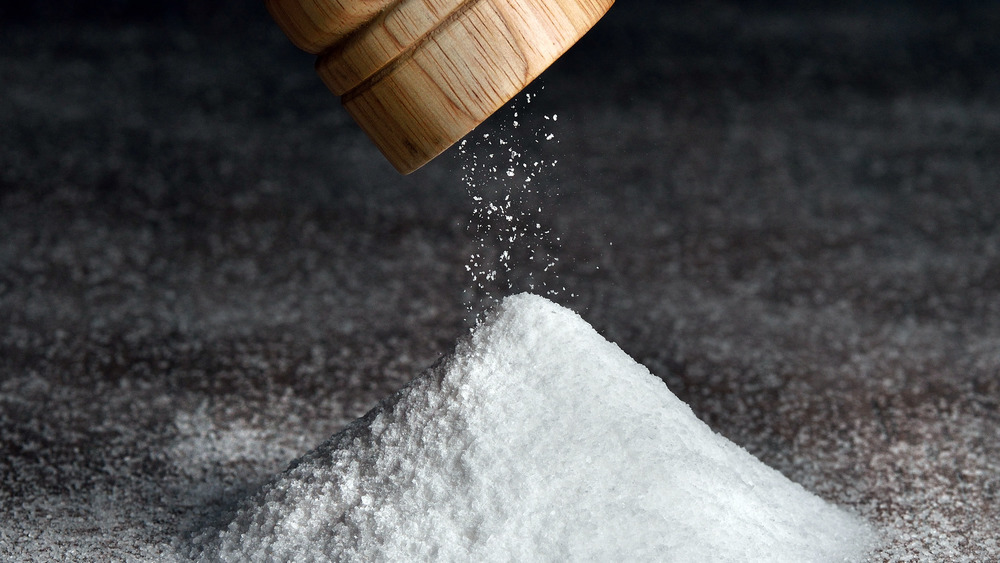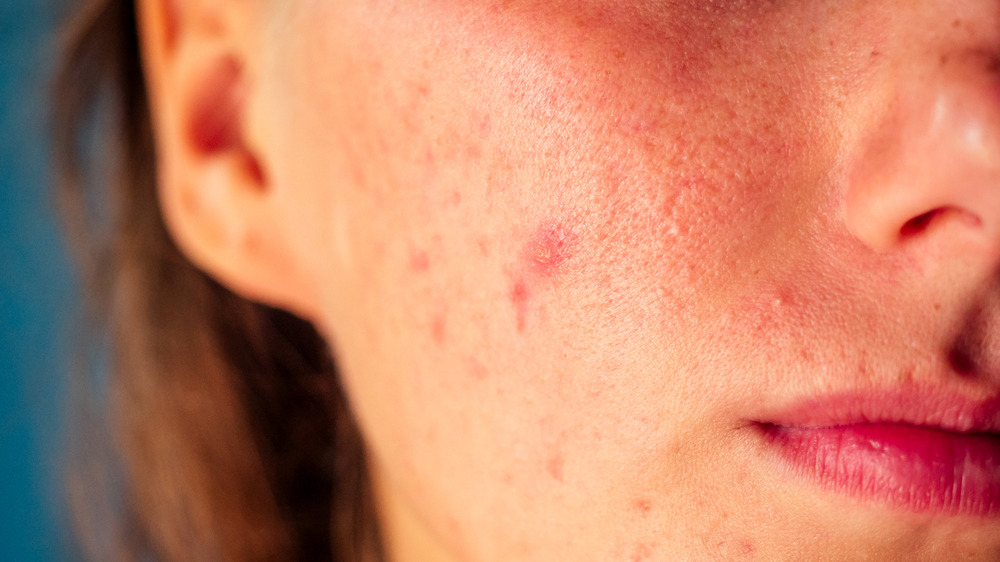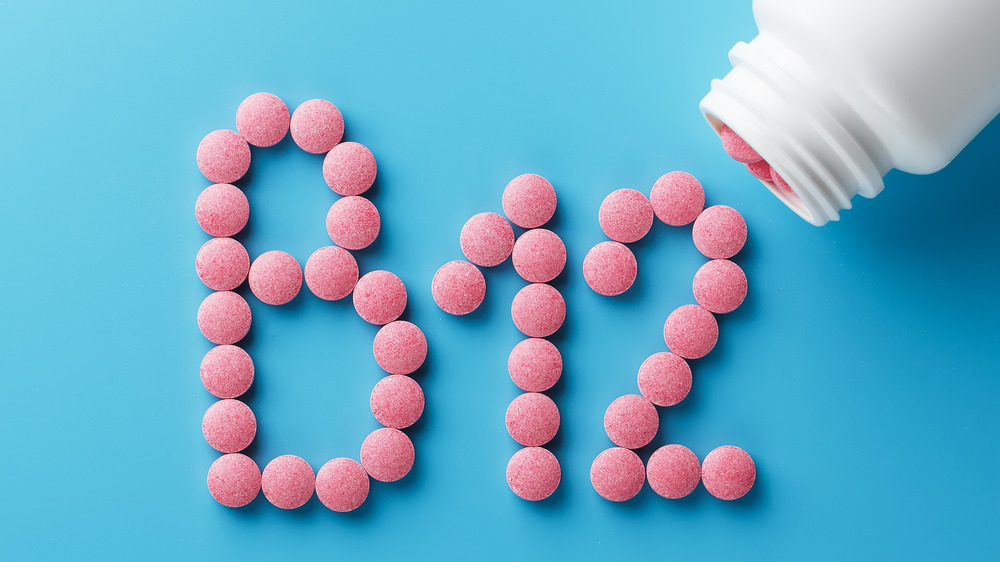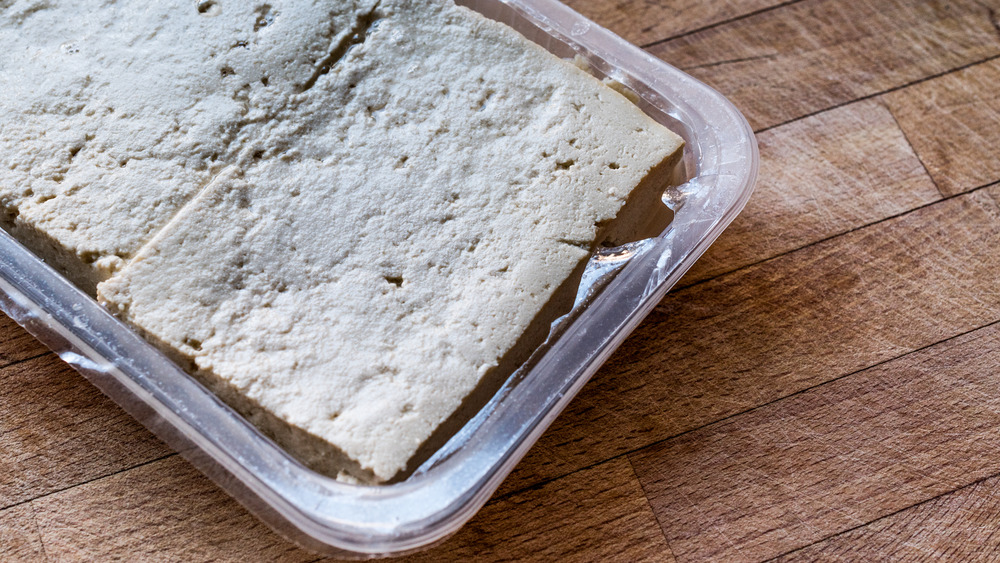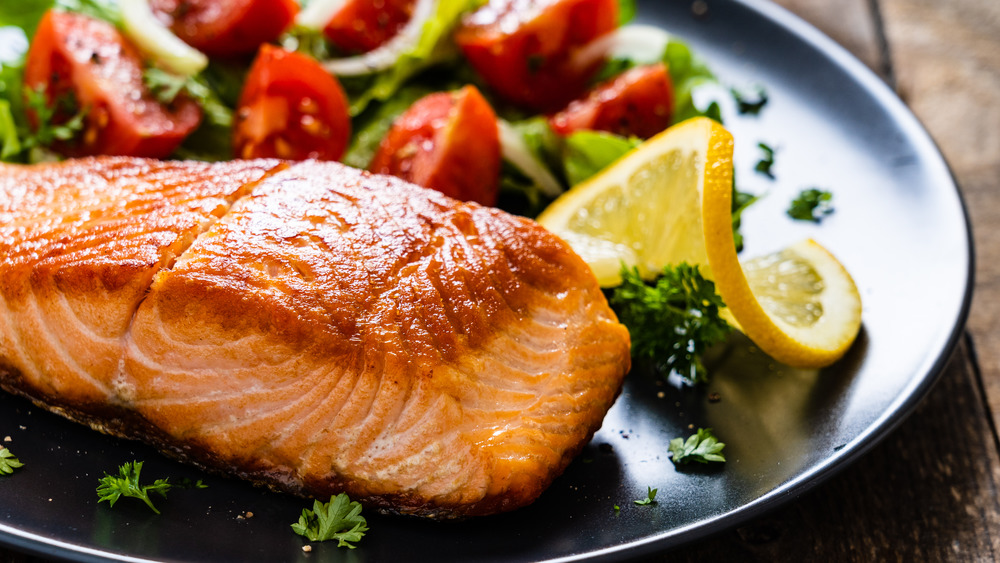When You Go Vegan, This Is What Happens To Your Body
Veganism, a plant-based diet and lifestyle choice that calls for abstaining from eating meat, dairy, eggs, and any other animal products, has seen an explosion in popularity over recent years, according to Healthline. And with over a half-million people worldwide having gone vegan for the first time in January (aka Veganuary) 2021, that popularity only looks set to rise (via Veganuary.com).
Although the choice to go vegan can often stem from an admirable concern for animal welfare, it's not the only reason people opt for the diet. According to Vegan Food and Living, which reported the results of a U.K. survey of over 8,000 people, 71 percent of vegans said they chose the lifestyle and diet due to animal welfare, but a growing number of people have chosen to go vegan due to environmental or health concerns.
If you're thinking about going vegan for your health, you'll surely want to know what happens to your body when you cut out meat and animal products. Join us as we take a closer look.
You won't necessarily miss out on protein when going vegan
Going vegan means cutting out all meat, dairy, and animal products. As such, you might have some questions about where your protein will come from if you opt for the change. That's a just concern, as consuming adequate amounts of protein is essential for growth and body cell maintenance, and insufficient protein leads to a weakened immune system (via Medical News Today).
Luckily, you can still be covered on the protein front if you choose to go vegan. As Kim Rose, a registered dietitian based in Florida, explained in an interview with the HuffPost, "A variety of nuts and seeds — such as pistachios and quinoa, beans and peas, and soy-based products — such as tofu and tempeh, are good sources of protein that also contain an array of vitamins and minerals that will properly nourish."
Although HuffPost recommends "being mindful of protein intake," you don't have to worry too much about where your protein is going to come from. As a vegan, you'll still have access to a variety of great, healthy sources.
Once you go vegan, you can say hello to a healthier gut
As the gut takes on the brunt of the work when it comes to processing food, it's important to treat it with love. That's why you might be pleased to hear that going vegan could actually help your gut health improve. The main reason for this is due to the way a vegan diet affects the gut microbiome. This is the name for the collection of gut bacteria, fungi, and viruses that live in your intestines. Far from causing your body illness, these organisms contribute enormously to your health by helping control your immune system and digestion (via Healthline).
By going vegan, you could be contributing to your gut microbiome's health. According to a study in Frontiers in Nutrition, vegan diets are great for your gut, with the study's authors explaining that veganism "is effective in promoting a diverse ecosystem of beneficial bacteria to support both human gut microbiome and overall health."
You may well end up losing a little weight when going vegan
Although veganism emphasizes a cleaner way of eating by removing meat and animal products from your daily intake, it isn't a diet that focuses on weight loss. Nevertheless, you could find your pants getting a little looser after going vegan.
According to the Harvard School of Public Health, consumption of red and processed meats have been associated with increased weight gain over time, as well as increased risk of diabetes, heart disease, and colon cancer. When a person removes meat from their diet, on the other hand, they gain less weight. By going even further and omitting all animal products from your diet, you could see some even more substantial results.
This was confirmed by a study published in the Journal of General Internal Medicine, which examined a selection of randomized controlled trials for correlations in weight loss. The study found that vegetarian and vegan diets appeared to have "significant benefits on weight reduction compared to non-vegetarian diets," with vegan diets seeing the most weight loss across the board.
Veganism can improve your heart health
As heart disease accounts for one in four deaths in the United States, according to the Centers for Disease Control and Prevention, taking care of your heart health is crucial. If you've been considering going vegan, you may be comforted to hear that the diet could help keep your heart healthy.
By removing meat and animal products from your diet and replacing them with plant-based whole grains, pulses, healthy oils, and nuts, you boost your levels of vitamins, minerals, and fiber, as well as decrease your intake of unhealthier processed meats and fats. This, according to Harvard Men's Health Watch, can help to lower blood pressure, lessen the risk of diabetes, reduce LDL cholesterol (aka "bad" cholesterol), and keep weight down — all of which contribute to a healthier heart.
It's important to remember, though, that removing animal products from your diet doesn't mean instant health. As the Harvard publication indicated, consuming an unhealthy plant-based diet heavy in refined grains, like pasta, white rice, and sugary drinks, can leave you with a higher risk of heart disease. So if you're going vegan for heart health, be sure to opt for healthy food sources.
Go vegan and you may experience a loss in bone mass
With any new diet, the body undergoes changes. Not all of these changes are positive nor visible. Going vegan, for example, could cause a less-than-welcome change to your bones. Yes, vegan diets have been associated with lower bone density.
As Kelsey M.Mangano and Katherine L.Tucker, both professors in the department of Biomedical and Nutritional Sciences at University of Massachusetts Lowell, write in the book Vegetarian and Plant-Based Diets in Health and Disease Prevention, "Vegans may be at increased risk for developing low bone mass due to lack of adequate consumption of specific bone-benefiting nutrients found largely in animal products, such as calcium, vitamin D, protein, vitamin B12, zinc, and n-3 fatty acids." Low bone density can lead to osteoporosis, which can result in easier bone breakage and back pain.
It's possible, however, to get good plant-based sources of the nutrients you need to maintain bone health. Calcium, for example, can be found in rich quantities in soy products, almonds, and white and black beans (via Healthline). It's important to consider where you'll get these vital nutrients once meat is out of the equation.
Your bowel health may improve when going vegan
People can get squeamish talking about bowel health, but let's face it: Everybody poops. And some people have an easier time doing it than others. If you find that your bowel movements are a little less than ideal, going vegan might just be a solution.
Embracing a vegan diet means that you'll likely be getting a lot more fiber, and a high-fiber diet can do wonders for your bowel health. As the Mayo Clinic states, a good fiber intake can help to normalize your bowel movements by making your stools bulkier and softer, decreasing the chance of constipation. High-fiber diets can also help to maintain bowel health by reducing the risk of hemorrhoids and bowel cancer.
Plant-based diets' contribution to better bowel movements has also been observed in studies, such as one 2016 study published in Clinical Nutrition. The study found that a 12-week vegetarian diet followed by participants resulted in less constipation and healthier bowel movements. Although the group examined was pretty small (40 people in total), the study is still fair evidence that plant-based diets could be useful if you're finding yourself straining a little on the toilet.
Your sense of taste might improve when going vegan
One of the most unique ways going vegan could make a difference is by improving your sense of taste. According to Dr. Shilpa Ravella, gastroenterologist and assistant professor of medicine at Columbia University Medical Center, veganism can affect your taste buds due to the emphasis on cleaner eating and the removal of animal food sources. The expert told Health, "We have evidence to back up the idea that even if you go a few weeks without junk foods and animal products high in salt, fat, and sugar, your tastes start to change".
What's amazing is how quickly this can occur, too, with Dr. Ravella noting that "even after just a few weeks, the sensitivity of our taste buds for fat can change." Although it's useful to remember that there are vegan choices out there that can be high in fats, sugar, and sodium — and a vegan diet is by no means automatically healthy — a general move away from animal products and an emphasis on less processed food sources could have you reclaiming your taste buds.
You could end up increasing your sodium intake while on a vegan diet
With the amount of plant-based imitation foods, like Impossible meat, and non-dairy milks out there today, there's never been an easier time to go vegan. But if you're swapping sausages for soy, watch out; your sodium intake could end up being higher than desired.
Although imitation meat products can taste almost the same as the real thing, that taste is sometimes due to high sodium levels in the product. And this is more common than you might think. According to Forbes, 28 percent of all meat-free products examined in the U.K. had higher levels of salt than the daily recommended adult intake. Some products surveyed had even more salt per 100 grams than seawater!
Additionally, an Australian study published in Nutrients found that only 4 percent of plant-based meat substitute products examined were low in sodium. This is, of course, a global issue, and excess salt intake can increase the risk of stroke, osteoporosis, and heart failure (via American Heart Association). Keeping an eye on the levels of salt in any products you buy is essential.
Your skin health may change when switching to veganism
If you're making a dietary change to reap healthy rewards, the last thing you want is to feel like things are getting worse. Unfortunately, when going vegan you might notice an unpleasant change to your skin health.
As dermatologist Pam Benito told Bustle, skin breakouts can be a common occurrence when switching to veganism. This is, in part, because you'll be swapping out your sources of protein. "As new vegans replace meat and eggs in their diet," Dr. Benito explained, "they may choose soy as their main source of protein." Unfortunately, soy products contain phytoestrogens, which can "alter the balance of hormones in the body and therefore cause breakouts," according to the doctor.
While this might not sound appealing, try not to worry. Dr. Benito says these breakouts may go on to clear up on their own, and some of the dermatologist's patients who've gone vegan wound up with "brighter complexion and better texture and also less bloating of the face." Nevertheless, she cautioned, "A vegan diet may not necessarily hold the answer to clear skin."
You can miss out on vitamin B12 when going vegan
Although veganism may seem restrictive, it can actually help you introduce some great diversity into your diet. Forgoing meat for the likes of tofu and tempeh could just revolutionize your kitchen game. Unfortunately though, taking away certain ingredients might mean that you're consuming fewer essential vitamins, some of which are harder to find in food sources.
Take vitamin B12, for example. This vitamin is essential to the body's health due to its function in producing red blood cells, promoting nerve tissue health, and maintaining brain function (via Medical News Today). B12 comes in ample quantities in meat, dairy, and other animal products. Unfortunately, following a vegan diet can mean that you may not get enough, as WebMD explained. This can lead to the potential for B12 deficiency that can cause weakness, nerve issues, vision loss, and depression.
If you decide to go vegan, make sure to consider your sources of this essential vitamin, and consider taking a supplement if necessary to make sure your health stays in tip-top shape.
Depending on what vegan products you eat, you may be consuming a toxic metal
Veganism is often considered a healthy choice, so the knowledge that going vegan might cause us to be ingesting literal toxic metals might not be the most attractive idea. Unfortunately, though, it's something you should keep in mind, particularly if eating more soy.
Although foods derived from soy are typically a nutrient-rich choice for vegan-friendly protein and can have benefits to heart health and blood pressure, a study published in Environmental Monitoring & Assessment found, soy-based foods like tofu can contribute to higher levels of cadmium intake in vegans and vegetarians. Although other foods contain cadmium in trace amounts, frequent or long-term exposure can lead to kidney, bone, and lung issues via Better Health Channel).
That said, the average levels of soy in your diet will be unlikely to cause significant issues. But if you're planning on eating soy quite frequently, it's worth being mindful of this potential hazard.
You may develop an Omega-3 deficiency when switching to veganism
Unlike other diets like pescetarianism, which incorporates fish and seafood to an otherwise plant-based diet, following veganism means that all animal-based food is off the table. While this can bring a range of positives, removing fish from your diet can mean you're losing a valuable source of Omega-3. This fatty acid found in seafood has huge benefits to your health, like reducing your risk of cardiovascular disease (via Cleveland Clinic).
As Healthline highlighted, getting adequate levels of Omega-3s from food is more challenging for vegans, as well as vegetarians. In some cases, this can cause an Omega-3 deficiency, leading to symptoms such as joint pain, dry eyes, and poor skin and hair health. To avoid this and keep your levels of Omega-3s high when moving to a vegan diet, try to incorporate foods like walnuts, Brussel sprouts, and chia seeds — all of which have good amounts of Omega-3s and can help you keep reaping the great health benefits of this incredible fatty acid.
You might get a little gassy after starting a vegan diet
Although embracing a planet-friendly vegan diet might have you beaming with pride, you might not be feeling so thrilled about one unfortunate side effect: gas. If you're feeling more flatulent after going vegan, however, there's no need to panic. This is usually due to an increase in fiber intake. As Insider explained, excess gas can be produced as a byproduct when gut bacteria processes fiber. The more fiber you eat, the more gas you may experience. Eating certain foods like broccoli, with its fiber-rich composition, can have you feeling even more gassy.
Although this might not be the most exciting thing to consider when going vegan, bear in mind that a high-fiber diet has valuable health benefits to your cholesterol and longevity (via Mayo Clinic). And that arguably offsets the gassy inconvenience. Over time, the excessive flatulence may well decrease, due to your body and gut microbiome changing, Insider revealed. So if it's a little windy down there, keep the faith!
By going vegan, you can reduce your cancer risk
Among the potential changes that could happen to your body by going vegan, one of them is pretty profound: You could be less at risk of developing certain cancers. According to the Mayo Clinic, reducing meat intake to embrace a plant-based diet could lower your likelihood of developing cancer due to poor dietary health. When examining the results of over 70,000 volunteers who supplied information about their diets, researchers found vegan participants had the lowest rates of cancer compared to other diets.
It's unknown exactly why this is the case, but the reduction of red and processed meats could be a large factor. According to a report published in PLOS Medicine, there's a link between certain meat intake and multiple cancers, with the study's authors noting "red and processed meat intake appears to be positively associated with risk of cancer of the colon and rectum, esophagus, liver, lung, and pancreas in a new, large US cohort study of 500,000 men and women."


